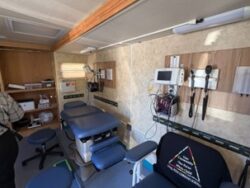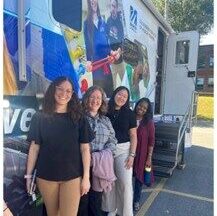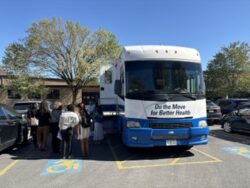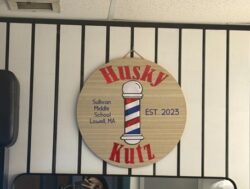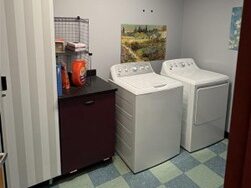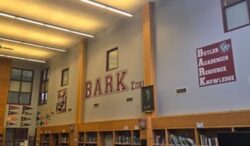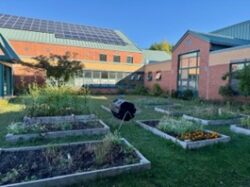
By Madeline Park and Lauren Campion
The school year is in full swing at Lowell’s Community Schools. Located northeast of Boston, the Lowell Public Schools district has been a recipient of the Full-Service Community Schools (FSCS) Grant from the U.S. Department of Education since 2015, which funds eight Community Schools. Their community school strategy is funded by a mix of federal and state funding, local district budget, and ample in-kind partnership support. A Community School is a public school—the hub of its neighborhood, uniting families, educators and community partners as an evidence-based strategy to promote equity and educational excellence for each and every child, and an approach that strengthens families and community. Lowell’s Community Schools are meeting their students and families where they are at, identifying barriers, cultivating evidence-based solutions through partnerships, and helping their students thrive in school and beyond.
IEL staff visited these three Community Schools at the end of September, learning about their successes in serving their students and implementing the Community Schools strategy. Lowell Public Schools is an urban district of about 14,500 students, 42% of whom identify as Hispanic, 26% Asian, 20% White, 8% Black, and 4% multiracial. Seven in ten students are economically disadvantaged, one in three are multilingual learners, one in ten experience homelessness, and one in three are multilingual learners. IEL staff visited three schools: Sullivan Middle School, Benjamin F. Butler Middle School, and Peter W. Reilly Elementary School.
Lowell Public Schools are committed to addressing all barriers to student engagement in their schools. Many students face barriers to health service access, but Lowell’s innovative RV-turned-Health Clinic helped ensure they got their vaccines on-site and started school on time. The Mobile Health Unit, in partnership with the University of Massachusetts Lowell Zuckerberg College of Health Sciences, Lowell Community Health Center, and seed funding from FSCS, has alleviated the issue of missed school due to medical non-compliance by providing 1209 vaccinations for 448 students since July. This RV-turned-Health-Clinic is an integrated student support that takes pressure off of school nurses, helps families by getting their students quick access to medical care, and builds trust in community partnership.
Image Description: Pictures from the Mobile Health Unit, from left to right: inside the unit, IEL staff outside the Unit, outside picture of the Unit.
Lowell Community Health Center’s Nurse Practitioner Cynthia Slaga said, “Sometimes parents struggle to get their children the necessary vaccines required for school. Without the vaccines the child is at risk of being excluded from school or delayed in starting school. The mobile clinic provides vaccines to children at school and therefore helps them access school in a timely manner. When parents register for school they are connected with the Mobile Health Unit where we can help them enroll in health insurance and access vaccines to start school. This partnership makes it possible for students to stay healthy and stay in school.”
At Sullivan Middle School, IEL staff got to sit in on a class on civil debate skills by Elevate New England, a youth non profit organization partner of Lowell Public Schools. Elevate provides students with multilingual mentorship, career readiness, and developing soft skills critical for workforce development. These students’ access to rigorous, community-connected instruction is Monday to Friday, integrated into school like a class; demonstrating a strong partnership built on a commitment to student learning and growth. Sullivan also opened the doors of Husky Kutz in 2023, an in-school barber shop where students can get free haircuts. Students have also found a trusted adult in their barber, Joey L’Heureux. Sullivan’s Community School Manager, Gayl Hurley, also showed IEL staff her plans to grow Sullivan’s services through a student-led laundry room and expanded food pantry for students and their families. By providing a space to address the basic needs of students and their families, students are more likely to attend school and collectively cultivate a welcoming environment of learning and community.
Image Description: Pictures from Sullivan Middle School, from left to right: encouraging language art, the Husky Kutz sign in the Sullivan barber shop, a picture of Sullivan’s Barber, Joey, giving a student a haircut.
Staff also visited Benjamin F. Butler Middle School, where it is clear that learning, community, and student wellness go hand and hand in their halls. Walking up to the school entrance, you see a flourishing community garden, whose harvest goes to the school food pantry, serving students and their families. With FSCS funds, they have created the B.A.R.K. Zone, an intentional space of knowledge sharing and mentorship, providing students with early access to college application tools and information on career pathways. The Butler team also showed IEL staff their Family Resource Hub, a digital space where parents can access resources on student health, school announcements, and social supports, helping families stay aware of school events and opportunities for engagement. Community School Manager, Neyder Fernandez, works closely with Principal Jaime Moody, using the Community School strategy as a lens for all of their collaborations, partnerships, and services. Butler also received local attention for their debut of a student-led laundry room, providing leadership opportunities for older students, and ensuring all students are able to come to school in clean clothes.
Image Description: Pictures from Butler Middle School, from left to right: IEL, Butler, and Lowell staff, the student-led laundry room, on the bottom row are the B.A.R.K. Zone and the community garden.
Peter W. Reilly Elementary School has begun its first year as a Community School. Community School Manager, Judy Chase, discussed with IEL staff her plans for a food pantry and community garden. They currently provide expanded learning opportunities through a before-school program that allows parents to drop elementary students off early, aligning with school drop off for Sullivan Middle School next door. This eases the stress of morning drop off for families juggling multiple student schedules, work, or other challenges.
Lowell Public School District is also utilizing impressive and innovative data solutions to better support their students. Lauren Campion, Director of the Student Resource Center and Solangel Alonzo, Lowell’s District Community Schools Manager, presented their Student Support Services Dashboard to IEL staff. They partner with Open Architects on a real-time early warning data system that tracks key indicators like chronic absence, behavioral referrals, and course performance to identify students who might need support. These numbers are translated into tiers of student need, and the dashboard visually maps students’ connections and supports as recorded by school staff. This ensures that students are being provided the services that best support them, to the degree they may need them.
Lowell’s Community Schools are meeting their students and families where they are at, identifying barriers, cultivating evidence-based solutions through partnerships, and helping their students thrive in school and beyond. This is what it means to be a Full-Service Community School. Thanks to the hard work of the Lowell Public School District, Full-Service Community Schools Grant, and hyperlocal partnerships and community investment, schools like Butler Middle School, Sullivan Middle School and Peter W. Reilly Elementary School provide their students access to essential services and knowledge and skill building, reducing barriers to student learning, and investing in the health, wellness, and futures of their students.
